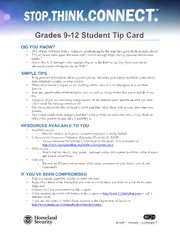
ERIC ED541450: Grades 9-12 Student Tip Card PDF
Preview ERIC ED541450: Grades 9-12 Student Tip Card
Grades 9-12 Student Tip Card DID YOU KNOW? • 20% of kids will have been a victim of cyberbullying by the time they graduate from high school.i • 79% of online teens agree that teens aren’t careful enough when sharing personal information online.ii • One in five U.S. teenagers who regularly log on to the Internet say they have received an unwanted sexual solicitation via the Web.iii SIMPLE TIPS • Keep personal information about yourself private, including your family members, your school, your telephone number, or your address. • Think twice before you post or say anything online; once it is in cyberspace, it is out there forever. • Stop any questionable online behavior; only do and say things online that you would do in real life. • Speak up. If you see something inappropriate, let the website know and tell an adult you trust. Don’t stand for bullying–online or off. • Use strong passwords that are hard to guess and don’t share them with anyone other than your parents. • Don’t open emails from strangers and don’t click on links for unfamiliar sites; if you think an offer is too good to be true, then it probably is. RESOURCES AVAILABLE TO YOU • StopBullying.gov o Find out what to do if you or someone you know is being bullied. • Cybersecurity Awareness Volunteer Education Program (C–SAVE) o Access resources for holding a cybersecurity discussion with your peers at http://www.staysafeonline.org/in-the-classroom/c-save • NSTeens.org o Watch real life stories, play games, and read comics that explore potential online dangers and how to avoid them. • iSafe.org o Become an iMentor and promote cyber safety awareness in your home, school, and community. IF YOU’VE BEEN COMPROMISED • Talk to a parent, guardian, teacher or adult you trust. • Keep all evidence of the interaction and write down the dates and times of when the incident happened. • Contact local law enforcement to file a report. • If you received an online solicitation, make a report at http://www.Cybertipline.com or call 1- 800-843-5678. • If you are the victim of online fraud, report it to the Department of Justice at http://www.justice.gov/criminal/cybercrime/reporting. Stop.Think.Connect. is a national public awareness campaign aimed at increasing the understanding of cyber threats and empowering the American public to be safer and more secure online. The Campaign’s main objective is to help you become more aware of growing cyber threats and arm you with the tools to protect yourself, your family, and you community. For more information visit http://www.dhs.gov/stopthinkconnect. i http://www.cyberbullying.us/research.php ii Lenhart A. Protecting Teens Online. Pew Internet and American Life Project, 2005, http://www.pewinternet.org/~/media/Files/Reports/2005/PIP_Filters_Report.pdf.pdf iii Crimes Against Children Research Center
